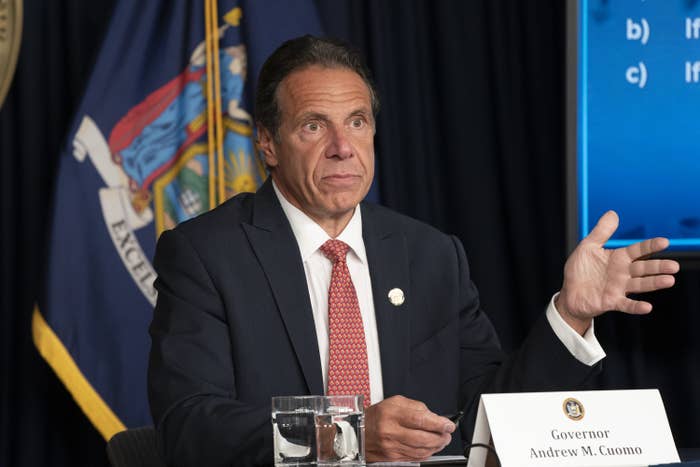
If you block out a couple hours to read the New York attorney general report on Andrew Cuomo, you will find the normal misery of reading about alleged sexual harassment. But once you really get into it, you will find that a bunch of weird Citizen Kane, All The King's Men stuff is alleged to have been happening in and around the New York governor's mansion.
The attorney general’s office reports that a state trooper was reassigned to Cuomo’s detail after meeting the governor once at an event, and that the governor’s aides tracked down, unbeknownst to her, the contact information of a young lobbyist after a similar meeting. One of the governor's senior aides testifies in this report that she draws up a list of women who receive a rose on Valentine's Day. The weirdness and power that permeates the report was on display in his video response to it last week, which featured photos of himself touching the faces of famous people and strangers.
That video was a flip of what Cuomo did well in 2020: publicly perform competence during a crisis period — even if the reality involved the attorney general also releasing a report about how the state undercounted deaths in nursing homes during the pandemic. Now, nearly every prominent Democrat says it’s time for Cuomo to go, which he won't oblige. That the New York legislative body might actually impeach Cuomo after a decade in power is logical, but it seems shocking — for reasons tied up in perception, performance, and the way refusal can break tangible methods for dealing with problems down.
Increasingly, it feels like politics ping-pongs between the courts and executive authority, with a level of performance and expectation management in between, and very little in the way of legislative recourse. Performance is always part of politics, even if you have a high-functioning legislative body. The overall endeavor involves a lot of signaling and modeling; there is meaning in the public presentation of competence or morality, even if the downstream effect can be unpredictable and nonlinear. When performance and reality get out of line, though, it can be hard to maintain basic plans (for instance: that this set of vaccines is good).
With regard to Cuomo, politics in the last 10 years has been dominated by an approach to crisis: the idea that if you manage the clock, and never concede, then you will win a war of attrition and retain power, rather than an ending, consequences, resolution. Donald Trump was not at all the first politician to just blow through the admission of fault, and refuse to apologize and bow out, but he was a real leader in the field, and you can see the downstream effects with Virginia Democrats Ralph Northam and Justin Fairfax, who basically followed suit, at least initially in the case of Northam.
When a crisis blows up and the offending party won’t go, and nobody really does anything, this leaves everyone else in a kind of suspended animation. Holding onto a conclusion about a bad thing, and its effects, can become challenging. The way we broadly use social platforms tends to cleave things into binaries, with an escalating need to complicate the original set of facts or allegations; even keeping to the original premise of condemning gross behavior can become tired or performative in and of itself.
Obviously people can and do atone and change course, and the idea that we’ve always got to be holding onto a firm sin isn’t any perfect either. But in politics, we’re mostly talking about the privilege of holding office, and the short-term, clock-managing, never-back-down approach messes with expectations and creates this weird cycle between perception and reality where the former can alter the latter, even when there is available recourse. Jan. 6 might actually be the apex of how corrosive this can be, where the dreamland becomes real: people who were told lies about the election results bashing in the actual glass windows of the literal Capitol and beating human cops with American flags.
A major issue we're having with politicians, celebrities, the media, and social media is how to handle people who act beyond the realm of what a supermajority considers OK, like the governor of a state feeling entitled to (allegedly) place his hand on a state trooper's abdomen in view of another state trooper, and what happens if they just refuse to comply with a call to apologize or resign. Cuomo has apologized, sort of, for some of the behavior alleged by women, but he's also defended his actions and not addressed the allegations concerning the state trooper at all. If, in these equations, the offending party just refuses to change their ways, or leave, then what exactly is everyone else supposed to do that’s proportional to the situation, in a pluralistic society with multiple entry points for the offending party to keep going?
And that’s why the idea that the New York legislative powers might actually move forward with impeachment seems a little shocking — it would be rearranging that dynamic where public refusal overwhelms everything else.
